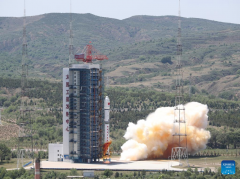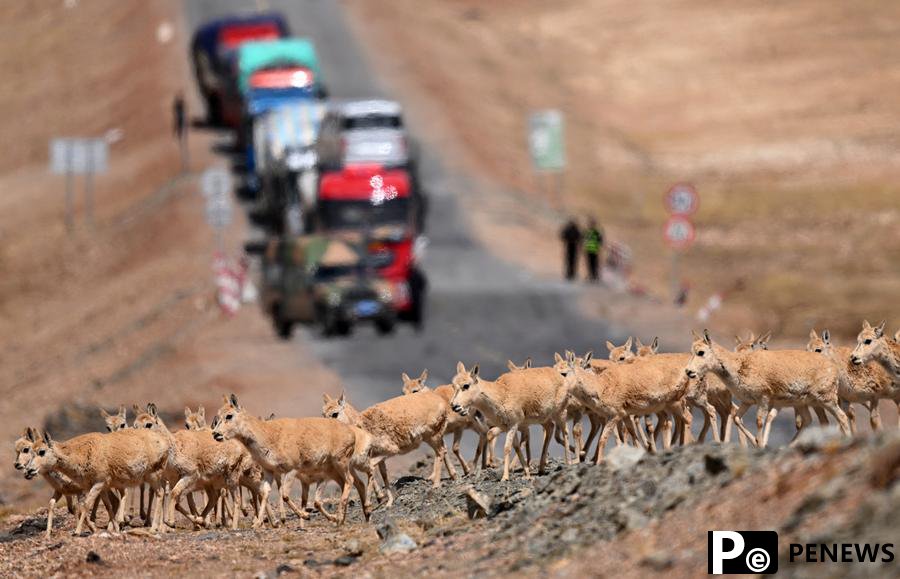Home>>
China should adopt regulations to address AI copyright infringements: CPPCC member(Global Times) 10:10, March 05, 2024
China should adopt regulations to clarify the fundamental issues of copyright protection in the field of artificial intelligence, as copyright infringement is regarded as one of the biggest obstacles to promoting industry flourishing, a political advisor proposed at the annual two sessions.
The explosive development of large generative artificial intelligence models represented by ChatGPT has brought unprecedented challenges to the copyright industry and artistic creation, and even poses a huge potential risk to the foundation of high-quality development of artistic creation and cultural prosperity, Qiu Huadong, a member of the Chinese People's Political Consultative Conference (CPPCC) National Committee, wrote in his proposal.
He noticed the fact that developers commonly use a large amount of copyrighted content in training activities without obtaining authorization from the rights holders or paying them compensation.
At the same time, Qiu said rights holders are unable to clearly understand how artificial intelligence uses their works, which is also one of the biggest obstacles to protecting their rights. This violates the provisions of the Civil Code and the Copyright Law.
In China, reactions to copyright of content generated by artificial intelligence have been mixed, Qiu said, adding that judgments of Chinese courts are not consistent either.
Besides, the theoretical arguments are often lacking, failing to provide guidance to rights holders, developers, and users of artificial intelligence, and users of content generated by artificial intelligence, which has hindered the orderly and positive development of the related market, the CPPCC further noted.
Using artificial intelligence programs to generate fake voices, and generate videos and audios could not only constitute serious infringement on natural persons' portrait rights, voice rights, name rights, and other personality rights and personal information but also pose a risk of confusing the public's visual and auditory perception through the use of deep synthesis techniques, he added.
The Beijing Internet Court ruled in an initial decision that an AI-generated image in an intellectual property dispute was an artwork protected by copyright law, which is the first case of its kind ruled in China.
The court recognized the picture generated via text-to-image AI image generator should be considered "artwork" under the protection of copyright laws based on the "originality" and intellectual input of its human creator.
According to this announcement, the court ruled in the first-instance judgment requiring the defendant to issue a public apology and pay the plaintiff 500 yuan ($70.16) in compensation. The defendant did not seek to appeal the initial decision.
However, the Global Times learned from some industry observers that the case emphasized whether the artificial intelligence-generated content (AIGC) constitutes a work with copyright cannot be generalized but should be decided on a case-to-case basis.
Most industry observers believed that writing prompts to generate a work is a simple task, resulting in minimal intellectual contribution to AI-generated image creation.
To address the challenges brought by copyright infringement, Qiu proposed that the country should issue supporting regulations of the Copyright Law that clarify copyright infringements in the artificial intelligence industry.
Without legal authorization, content protected by copyright and related rights should not be used in the training or pre-training process of artificial intelligence models, and it is not appropriate to include the training or pre-training activities of artificial intelligence models in the scope of fair use of copyright, he said.
“Those regulations should clearly stipulate that content generated solely by artificial intelligence without human creative participation should not be protected by copyright or related rights,” Qiu noted.
In addition, the standards for copyright protection of AI-generated works should be specified, such as the extent of human involvement and how to measure it (including but not limited to judicial practice activities).
Furthermore, he said that China should issue relevant laws, regulations, and departmental rules that are able to ensure the use of copyright content can be traced.
Apart from lawsuits relating to AI-generated images, China has also seen a first legal dispute over a virtual human.
In July 2022, a technology company in Hangzhou uploaded a video to their Douyin account featuring Ada, a virtual human created by Shanghai-based Xmov Technology but failed to acknowledge Xmov as the original creators. The Hangzhou Internet Court later sided with Xmov, ordering the infringing company to pay 120,000 yuan in compensation.
(Web editor: Tian Yi, Liang Jun)









